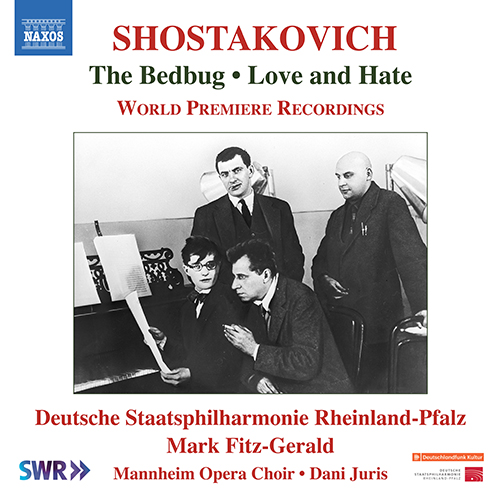SHOSTAKOVICH, D.: Bedbug (The) / Love and Hate (Mannheim Opera Choir, Rheinland-Pfalz State Philharmonic, Fitz-Gerald)
Shostakovich was still a young composer when he was hired to provide incidental music for The Bedbug, a surreal and farcical satire on Communist utopian dreams and bourgeois corruption and vulgarity. He produced a terrifically knockabout score that draws on local fireman’s bands and American dance music. Illustrated by Shostakovich’s powerful middle-period music, Love and Hate is a film about female fortitude set in a mining village during the 1919 Civil War. The innovative score, newly reconstructed by Mark Fitz-Gerald from rough piano sketches and the 1935 soundtrack, combines symphonic sections with popular songs.

|
Oops! Something went wrong!
The application has encountered an unhandled error.
Our technical staff have been automatically notified and will be looking into this with the utmost urgency.
|

Conductor Richard Rosenberg is the Artistic Director of the National Music Festival. Earlier music directorships include the Hot Springs Music Festival, RESONANCE, the Corpus Christi Symphony, the Chamber Orchestra of California, the Waterloo/Cedar Falls Symphony and the Pennsylvania Ballet. He also served on the conducting staffs of the Baltimore Symphony, the Oakland Symphony, the London Classical Players and the Aspen Music Festival, and as Acting Director of Orchestras at the University of Michigan in Ann Arbor. As a guest conductor, Richard Rosenberg has performed with the Rochester Philharmonic, the Kennedy Center Opera Orchestra, Miami City Ballet, and symphony orchestras and ballet companies throughout the United States, Europe and South America. Rosenberg’s teachers include Leonard Bernstein, Herbert von Karajan and Sir Roger Norrington. His numerous orchestrations and his corrected editions of Bach, Schoenberg and the complete orchestral music of Gottschalk and the Créole Romantics have received performances by orchestras all over the globe. He appears on ten recordings of American music for the Naxos Records label, and has produced several CDs with jazz legend Dave Brubeck.
Edmond Dédé was born in New Orleans, his father a professional musician of French West Indian origin, and one of the free blacks in the south of the United States. Edmond was to become an outstanding violinist, who worked in a cigar factory by day, and in orchestras in the evening. By this method he saved sufficient for his passage to Paris, where at the age of 30 he was recommended to study with the famous composer, Halevy. Apart from one short visit, he never returned to the United States, his career built largely in the south of France, where for many years he was conductor of the Grand Théotre orchestra in Bordeaux. He was to compose music in many genres, from operetta and ballet to chamber music and popular songs. Though an American influence lingered in his music, it had become modified by his French tuition, and his conducting of the French repertoire. The style is traditional mid-19th century, with a most pleasing melodic content, and a skilful use of the orchestra. His son was to succeed him as an instrumentalist and composer. Though famous in France, his music disappeared from the repertoire, and was not rediscovered until the conductor, Richard Rosenberg, found it in the archive of the Bibliothèque National in Paris. The exact extent of his output is not known, but it was large and encompassed operettas, ballets, songs and chamber music. The music found was not in good condition, considerable ‘renovation’ required to bring it to performing standards.































